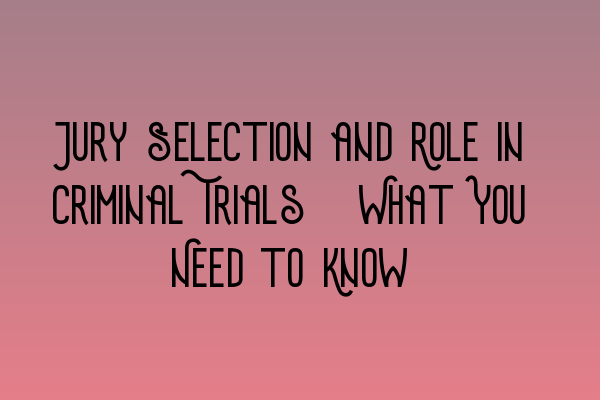Jury Selection and Role in Criminal Trials: What You Need to Know
Welcome to our SQE Criminal Law & Practice Law UK blog! In today’s post, we will be diving into the fascinating world of jury selection and the crucial role they play in criminal trials. Whether you are a law student preparing for the SQE 1 exam, a legal professional seeking further insight, or simply someone interested in the criminal justice system, this article will provide you with the essential information you need.
Understanding Jury Selection
In criminal trials, the accused has the right to be judged by their peers. This is where the concept of a jury comes into play. A jury is a group of ordinary citizens selected to hear the evidence presented in a criminal case and decide the defendant’s guilt or innocence.
Jury selection, also known as voir dire, is the process of choosing the members of the jury. It involves questioning potential jurors to ensure they are unbiased and can fairly evaluate the evidence presented during the trial.
During the voir dire process, both the prosecution and defense attorneys have the opportunity to ask potential jurors questions to determine their suitability. They may inquire about their personal beliefs, experiences, and any potential biases that may affect their ability to remain impartial. The goal is to select a jury that is unbiased and capable of making a fair and informed decision.
It is essential to note that certain individuals may be disqualified from serving on a jury, such as those with criminal records or conflicts of interest. The exact criteria for disqualification may vary depending on the jurisdiction.
The Role of the Jury in Criminal Trials
Once the jury selection process is complete, the chosen jurors take on a crucial role in the criminal trial. They are responsible for listening to the evidence and deciding the defendant’s guilt or innocence based on the facts presented.
The jury must carefully consider the testimony of witnesses, examine any physical evidence, and assess the credibility of the parties involved. They must also follow the judge’s instructions regarding the relevant laws and legal principles that apply to the case.
It is important to highlight that the jury’s decision must be unanimous in criminal trials. This means that all members of the jury must agree on the verdict. If they cannot reach a unanimous decision, the trial may result in a hung jury, leading to a mistrial.
Throughout the trial, the jury plays a vital role in safeguarding the defendant’s right to a fair trial. They act as the ultimate fact-finders and ensure that the case is decided by a group of individuals who are free from bias or influence.
Conclusion
Jury selection and the role of the jury in criminal trials are essential components of the criminal justice system. The selection process aims to ensure that unbiased individuals are chosen to serve on the jury, while the jury’s role itself is to listen to the evidence, apply the law, and deliver a fair and unanimous decision.
If you’re a law student preparing for the SQE 1 exam, we recommend checking out our related articles:
- SQE 1 Practice Exam Questions
- SQE 1 Practice Mocks FLK1 FLK2
- SQE 2 Preparation Courses
- SQE 1 Preparation Courses
- SRA SQE Exam Dates
For more legal insights and exam preparation resources, please stay tuned to our blog. If you have any questions or require professional legal assistance, feel free to reach out to our team at SQE Criminal Law & Practice Law UK.
